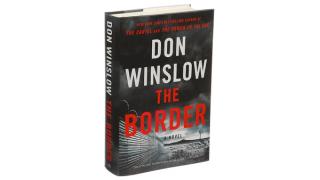Don Winslow first established himself as a writer of uncommon insight and persuasive power with his 2006 thriller, The Winter of Frankie Machine. Its impact alone brought New York-born, California-based Winslow to Australia for the Sydney Writers Festival. It remains a classic of San Diego crime fiction, enveloping in its tale of malice and mischief; entertaining in its wit and wisdom.
But it is on the other side of the US-Mexico border that Winslow has made his literary residence. Two of his previous novels, The Power of the Dog and The Cartel, are convincing portraits of the Mexican drug cartels, from Sinaloa to the Zetas, that dominate the illegal drug markets of the Americas and reach beyond into Europe and the Asia-Pacific.
Now we have the final part of this trilogy, The Border, which picks up with Art Keller, now head of the Drug Enforcement Agency in Washington, DC, having departed Guatemala after an horrific battle between sicarios of the Sinaloa and Zeta cartels.

The vicious head of the Sinaloa cartel, Adan Barrera, is missing. Keller knows how his bete noire is finished. The missing piece in the firefight in Guatemala is an incursion by US mercenaries sanctioned off the books by the Obama administration.
Barrera bears passing resemblance to El Chapo (Joaquin Guzman), recently convicted in Federal Court in New York City of multiple felonies. El Chapo is probably headed for the Administrative Detention Facility in Florence, Colorado. In the real world this is the “Supermax”, a place where the most hardened criminals are detained, and which features in The Border.
Keller is now married to the remarkably brave Marisol Cisneros, the mayor of Valverde, who suffered grievously at the hands of the Narcos for standing up to them. She still bears the wounds. They now live in Washington, DC, since Keller’s appointment to head the DEA. He was a reluctant starter but was persuaded by senator Ben O’Brien (Republican, Texas). O’Brien is forthright in his dealings with Keller and he has credit in the bank. He assisted in organising the American mercenary contingent for Guatemala. They meet in El Paso.
O’Brien tells Keller that between 2000 and 2013 fatal heroin overdoses in the US rose from 2000 a year to 8000 a year. “To put it in perspective,” he continues, “from 2004 to now we lost 7222 military personnel in Iraq and Afghanistan combined.”
Keller adds another perspective: “In the same period of time, over 100,000 Mexicans were killed in drug violence, with another 22,000 missing. And that’s a conservative estimate.”
O’Brien agrees: “The loss of life you cite in Mexico, the heroin epidemic here, the millions of people we have behind bars. Whatever we’re doing it’s not working.”
The senator is right, the American war on drugs is failing, and Keller decides to change policy, despite the objections of conservative Republicans including presidential candidate John Dennison. Donald Trump once used the assumed names John Barron and David Dennison. Winslow’s view of Trump will emerge later in the novel, but this is an intriguing allusion.
The Mexican cartelistas behave with a ferocity that is scarcely human. As with earlier novels, the pages of The Border are soaked in blood. Much of it is innocent.
In The Cartel, Winslow focused on the courage of Mexican media in exposing the corrosive grip of the drug lords over Mexican society. On the first page of The Border, there is a list of Mexican journalists murdered by the cartelistas.
The Border is characterised by incomprehensible violence.
Student protesters who hijack a bus, not knowing there is heroin secreted on board, are murdered in a joint operation between police and Narcos, their bodies tossed on to a rubbish heap and burned. A criminal who has stolen Sinaloa protection payments is murdered by having his feet burned off with acid. The murder is overseen by the sadistic Belinda Vatos, the security chief for one of the Sinaloa splinters. Indeed, some of the most vividly drawn characters within the novel are women.
Keller’s policy is to fight the cartels on the American side of the border, tracking the money. This leads him to Wall Street and a disturbing discovery. Presidential candidate Dennison has a son-in-law, Jason Lerner, whose real estate dealings have made him vulnerable to investment of cartel money.
The Border is a compelling final novel in Winslow’s trilogy.
The Border
By Don Winslow. Harper Collins, 720pp





